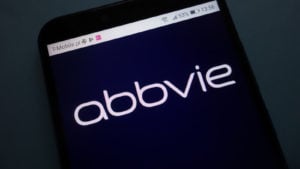AbbVie (NYSE:ABBV) stock is both cheap and has a very attractive dividend yield. In addition, this pharmaceutical company’s growth prospects are high, now that its purchase of Allergan is closed.

For example, the stock trades on a forward earnings ratio of just 9.2 times 2020 expected earnings. It is even lower with 2021 earnings prospects.
In addition, the $4.72 per share annual dividend is very attractive to most investors for several reasons. For one, the dividend yield for ABBV stock is much higher than the average stock.
Secondly, the dividend is likely to keep on growing at a nice pace. For example, on June 17 AbbVie declared a $1.18 quarterly dividend for the third time. After the fourth quarterly dividend at this rate, I suspect the company will raise the dividend in Q4. According to Seeking Alpha, AbbVie has had a 20.86% dividend growth rate annually on a compounded basis.
Lastly, the dividend is still well covered by the company’s earnings. For example, Seeking Alpha‘s poll of 15 analysts’ estimates of 2020 is $10.46 per share. But the dividend rate right now is $4.72. So the dividend is more than 100% covered by earnings.
Why Is AbbVie Stock So Cheap?
AbbVie’s main revenue driver, up until its recent acquisition of Allergan, was Humira, a rheumatoid arthritis drug. It also acts as an anti-inflammatory drug for other conditions including Crohn’s disease, psoriasis, ulcerative colitis, etc. It is the world’s best-selling drug.
But adalimubab, the actual name of the drug, went off-patent in 2016. Recently, generic versions of the drug have become available.
The problem for AbbVie is that up until Q1 2020, Humira accounted for 54.5% of its revenue. AbbVie said its Q1 sales were $8.619 billion, up 10.7% year-over-year. But Humira sales were $4.703 billion, up 6.4%.
This is the most likely reason for AbbVie’s low valuation. It is too reliant on one drug and that drug is now off-patent. The market assumes that generic drugs will eventually overtake that revenue stream for AbbVie. But things are not as bad as that.
Why Investors Need Not Be So Worried
First of all, Humira does not go completely off-patent in the U.S., even though in some other countries this has happened. Its core U.S. patents went off-patent in 2016, but it has a “patent thicket” that extends its exclusivity to as late as 2034, according to one source. Another source says its exclusivity extends to 2023.
Second, the company will now have a much lower reliance on Humira. On May 8, AbbVie closed on its acquisition of Allergan for about $63 billion in cash and stock. Allergan made $3.6 billion in sales in its latest quarter and $378 million in profits.
So you can see that on a pro-forma combined basis, Humira will now account for a lower amount of total sales. They would total $12.2 billion on a combined basis in Q1. But Humira’s $4.7 billion would account for only 38.4%. Given that other drugs in the portfolio are likely growing faster than Humira, that portion will continue to fall.
So the risk is falling for the over-reliance on one drug. But some analysts point out that AbbVie’s other drugs and its pipeline are very attractive as growth drivers.
Valuing AbbVie Stock
Given that management clearly seems intent on growing its dividend, we can use this aspect of the return of capital to value AbbVie stock. Let’s assume the dividend next rises 10% next year, just like it did this year. That would put the annual dividend at $5.20 per share.
The historical dividend yield for AbbVie stock has been 4.22% over the past four years, according to Seeking Alpha. Therefore, by taking the $5.20 dividend per share and dividing it by 4.22%, the target price is $123.22 per share
That represents a significant gain over the current price of about $98. So not only is AbbVie stock cheap with an attractive dividend yield, but it also has good upside potential.
Mark Hake runs the Total Yield Value Guide which you can review here. As of this writing, Mark Hake, CFA does not hold a position in any of the aforementioned securities.
